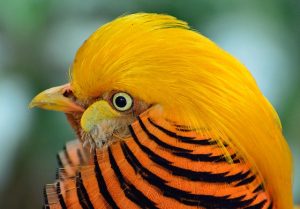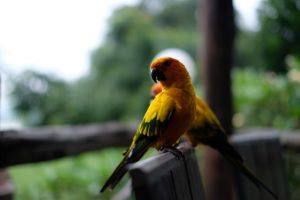Exotic apartment birds are bred in captivity by humans for their special body posture, lively behavior, varied colors, for their song and last but not least for the attachment they show to those who care for them.
The most popular exotic birds found in our country are: the wavy turkey, the canary, the Australian zebras, the nymphs, the Little and the Great Alexander.
If we want to buy a bird, we must differentiate between a sick and a healthy bird.
Thus, the healthy bird has a shiny plumage, lively eyes, clear eyes, no mucus in the nostrils, sings, chirps, is attentive to the movements of people nearby, feeds and drinks water, feathers around the cloaca are clean, no manure.
A sick bird prefers isolation and standing on the ground, the plumage is flattened, it is kyphosed, it is devoid of tone, it no longer sings, ocular and nasal secretions appear, the feathers around the cloaca are soiled by manure.
The next step is to choose the cage . The size of the cage must take into account the number and body size of the birds. In order to feel comfortable, a bird must have a cage that allows it to spread its wings without hitting the bars and change its position easily.
The cage is not located near windows or other sources of electricity or heat, but still should not be positioned in an isolated place, completely separate from human activity in the house. Also, both the cage and the accessories will be washed and disinfected weekly or whenever the situation requires it, the water changes daily, the food as well.
As for accessories, they should not be numerous nor limit the space for movement, generally a swing, a few fixed bars or branches with a seed stick and a cuttlefish bone are enough to make the bird feel good. In specialty stores there are various models of feeders and drinkers with attractive shapes and colors.
Providing water at discretion and a healthy diet are essential conditions for the proper functioning of the body of birds.
Healthy involves taking mixtures of seeds supplemented with fruits and vegetables. It is considered that by feeding the birds only with seeds there is an imbalance in the intake of minerals and vitamins. The recommended seed mixtures are: white millet, yellow millet, red millet (preferred by turkeys and canaries), peeled oats, wheat, corn, hemp, flax, sunflower seeds (preferred by large parrots).
 Fruits and vegetables that can be administered are represented by: apples, pears, bananas, strawberries, melons, carrots, bell peppers, cucumbers, parsley, lettuce leaves, spinach, dandelion, etc. All this will always be fresh, and before administration it is washed and dried very well. In certain periods such as the one preparing for reproduction, the one for raising the chicks, during the moulting, the birds also need animal feeds, of which the most complete is the boiled chicken egg.
Fruits and vegetables that can be administered are represented by: apples, pears, bananas, strawberries, melons, carrots, bell peppers, cucumbers, parsley, lettuce leaves, spinach, dandelion, etc. All this will always be fresh, and before administration it is washed and dried very well. In certain periods such as the one preparing for reproduction, the one for raising the chicks, during the moulting, the birds also need animal feeds, of which the most complete is the boiled chicken egg.
Potentially toxic and prohibited foods and foods in poultry feed are: avocado fruits, apple seeds, pears, onions, mushrooms, houseplants (azalea, geranium, ivy, philodendron, rhododentron), alcohol, tobacco leaves, chocolate, moldy foods, fats, spices.
Any new assortment is introduced gradually, in small quantities over several days. The most common diseases of cage birds are located in the digestive tract (diarrhea with different causes, endoparasitism) and respiratory. External parasitism is common: leg cramps, lice, ticks. Another problem is poor beak growth that requires periodic adjustments as well as claws that can grow more than normal, making it difficult to move.




